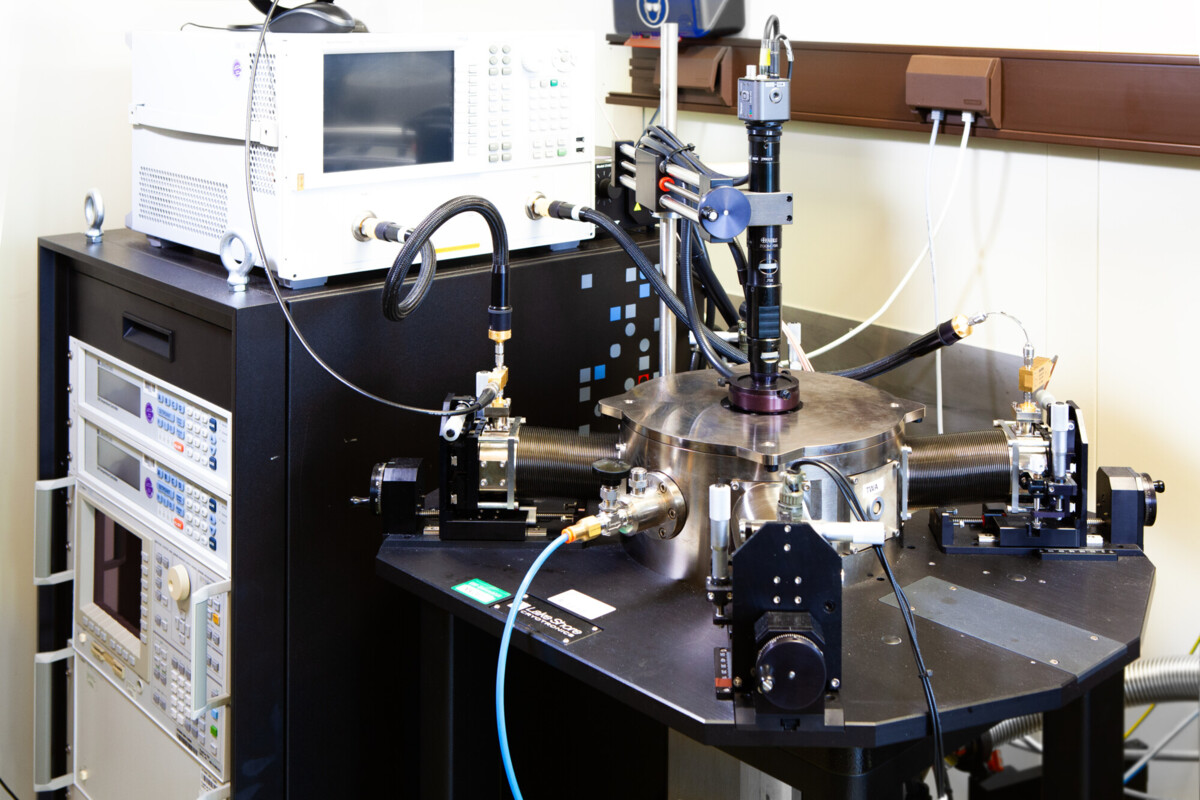Fraunhofer IAF researches novel components for quantum computers in the project „SEQUENCE“
European project aims to scale up quantum computing technology
SEQUENCE is an innovative European research project that uses unconventional approaches to develop electronics for low temperature operation. This will enable quantum computers to scale up to be able to tackle a variety of important technological and scientific problems as well as improve satellite and terrestrial communication systems. For this ambitious project, Fraunhofer IAF contributes its expertise in the field of technology development, circuit design and low-temperature measurement technology for ultra-low noise high-frequency electronics.


Electronics cooled to low temperatures will have a strong impact on our society through applications spanning space communication, high performance computing, and quantum enhanced computing. Quantum computers, for instance, have the potential to radically advance our computational capability and are predicted to strongly influence fields such as medicine, chemistry, science and finance by solving computational problems that cannot readily be solved by classical computers.
There are several promising technologies to realize quantum bits (qubits), which are the fundamental building blocks for quantum computers. Most of these, such as superconducting qubits, spin qubits and Majorana fermions, typically require very low (cryogenic) temperatures below -270°C to operate. A variety of bias, readout and control electronics for the qubits is required to perform computations.
Presently, this is done using bulky equipment requiring a large set of long cables to be connected to the cooled qubits. Since the number of qubits needs to be scaled up significantly for quantum computing to become widely applicable, it is clear that a better solution needs to be developed where the electronics is cooled and placed in close vicinity of the qubits.
Thus, there is a need for the development of electronic devices and circuits with a variety of functionalities. These need to be compatible with low temperature operation and have low noise and negligible heating to avoid disturbing the sensitive qubits. Achieving this will require enhanced understanding of the limitations of existing transistor technologies currently used for room temperature operation, development of 3D integrated systems and utilization of unique low-temperature effects in novel nanoelectronic devices.
In the European project SEQUENCE (Sense and Readout Electronics Cryogenically Integrated for QUantum ENhanced Computation and Evolving Communication) nine partners including universities, research institutes and industry from all over Europe are collaborating to tackle these challenges. The project will provide a versatile electronic platform by combining Si CMOS, III-V and 3D integration technologies to support the scaling of both superconducting and spin qubit based quantum computers.
The challenges associated with operation at cryogenic temperatures will be addressed using innovative approaches to device design and fabrication that even turn the low temperatures into an advantage. Due to strong synergies, this electronic platform will not only enable quantum computers with improved scalability, performance and reduced cost, but will also have an impact on other important application areas such as space and terrestrial communication, radar technologies and high-performance computing.
The project will develop a variety of RF circuits such as low noise amplifiers, mixers, oscillators, digital-to-analog converters, multiplexers and RF switches that operate at extremely low power levels and also utilize the benefits of the low ambient temperature to achieve high performance.
“The development and integration of high speed electronics for low temperature operation is critical for the scaling of quantum computers that will enable the next step in the quantum revolution and will in addition improve future communication systems for a more connected world”, says Lars-Erik Wernersson, professor at Lund University and project coordinator.
The SEQUENCE consortium consists of partners with a wide range of experience and expertise within material science, devices, circuits and systems. The partners are Lund University (Sweden), Fraunhofer IAF (Germany), Institute Polytechnique de Grenoble (France), IBM (Switzerland), CEA-LETI (France), University of Glasgow (UK), the Tyndall National Institute (Ireland), C2Amps (Sweden) and Ecole polytechnique fédérale de Lausanne (Switzerland).
Low-noise cryogenic electronics at Fraunhofer IAF
Fraunhofer IAF contributes its expertise in the field of technology development, circuit design and low-temperature measurement technology for ultra-low noise high-frequency electronics. “In SEQUENCE, we benefit from many years of experience with cryogenic electronics for radio astronomy. For new applications, such as quantum computing, we have to further improve the noise of our amplifiers in order to push the properties of the readout electronics as close to the physical limit as possible,” explains Dr. Fabian Thome, Project Manager on the part of Fraunhofer IAF.
Press release from Lund University: European project aims to scale up quantum computing technology
The use of the photos is permitted exclusively in connection with this press release and under indication of the copyright.

SEQUENCE is funded by the European Union H2020 Programme for Research and Development of the European Union (Grant – 871764).
Last modified:
 Fraunhofer Institute for Applied Solid State Physics IAF
Fraunhofer Institute for Applied Solid State Physics IAF